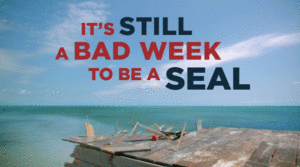Shark Week Hoo Ha Ha
Published on July 30, 2017, at 5:52 p.m.
by Elizabeth Selmarten.
If you’re like me, you know the most wonderful time of the year has been upon us: Shark Week. If you’re also like me, you have had a Twitter countdown followed by a live-tweet session filled with shark-related gifs for the entire one-week event.
Shark Week is a glorious time of year for brands, shark enthusiasts, conservationists and, of course, Discovery channel. The splashy week is filled with everything shark-related from Shark Week ice cream to shark fin soap to the actual Shark Week programming itself. It’s basically a nonstop shark-themed PR party that’s great for everybody but the seals.

Discovery’s iconic Shark Week is more than just an annual week in the summer filled with educational shark documentaries. It’s also more than a witty publicity event for the channel. It’s actually an impressive public relations campaign for sharks.
Plagued by the shark stereotype manifested in Jaws, the best summer blockbuster of all time, sharks found themselves in their own crisis communications situation. With sharks unable to speak to humans for themselves, Discovery and others saw an opportunity to capitalize on people’s fascination with the species and educate people on the plight of the sharks while gaining visibility, revenue and coverage for the respective brand.
Shark Week itself has come a long way since it first aired in 1988. What originally started out with only four shows and no formal hosts has now bloomed into an event filled with multiple series, after shows, host Eli Roth, special guest appearances such as Olympic GOAT Michael Phelps, cross-brand promotions and more. The program scored a then-record-breaking 53.2 million viewers in 2013, and in 2015 set a U.S. TV viewership record, attracting an average 1.27 million viewers per program, smashing the previous 2013 record of an average 1.2 million, according to brandchannel. Shark Week also expanded to over 220 countries and territories in 2016.

The hit week of programming owes some of its visibility success to its social media virality. Several videos and gifs from the program have received much hype and views over the years. Most notably viral is the 2013 “Snuffy the Seal” Shark Week promo, which has received over two million views and spun off a series of additional viral promos featuring its tagline of “Shark Week: It’s a bad week to be a seal. For the rest of us it’s pretty awesome.”
At its heart, sharks are a topic that everybody is familiar with on some level or another, whether from movies like “Finding Nemo” or “Sharknado,” real-life encounters or textbooks. Discovery was able to take that topic — that opportunity — and develop a culture around Shark Week that actually has transcended the programming itself. The PR campaign for the sharks has become this ingrained pop culture phenomenon that consistently creates a social media feeding frenzy every summer.
Not all of the Shark Week conversation on social media comes from actual program viewers like me; a large amount of people talking don’t actually watch Shark Week. By creating the Shark Week culture, Discovery has sparked an interest and desire for people to weigh in on the topic, even if it’s with just a tweet featuring a left shark gif.




